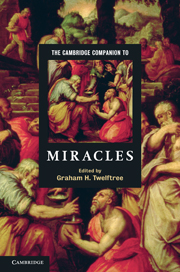Book contents
- Frontmatter
- Introduction
- Part I Fundamental issues
- Part II Miracles in antiquity and the Middle Ages
- Part III Miracles and major religions
- 9 Miracles in traditional religions
- 10 Miracles in Hinduism
- 11 Miracles in Islam
- 12 Tales Of Miraculous Teachings: Miracles In Early Indian Buddhism
- 13 Miracles in Christianity
- 14 Miracles in Jewish philosophy
- Part IV Miracle today
- Index
14 - Miracles in Jewish philosophy
from Part III - Miracles and major religions
Published online by Cambridge University Press: 28 May 2011
- Frontmatter
- Introduction
- Part I Fundamental issues
- Part II Miracles in antiquity and the Middle Ages
- Part III Miracles and major religions
- 9 Miracles in traditional religions
- 10 Miracles in Hinduism
- 11 Miracles in Islam
- 12 Tales Of Miraculous Teachings: Miracles In Early Indian Buddhism
- 13 Miracles in Christianity
- 14 Miracles in Jewish philosophy
- Part IV Miracle today
- Index
Summary
BIBLICAL AND RABBINIC ROOTS
We can begin with the obvious fact that most of the Hebrew Bible is organized in chronological fashion and that many of the events it narrates appear to be supernatural, for example creation, the flood, the exodus from Egypt, revelation at Sinai. But we should be wary of attributing a modern view of miracles to an ancient text. For a modern theist, nature is an impersonal system of causes and effects that God oversees and interferes with when circumstances warrant. Thus a miracle is often defined as a violation of the natural order. It is noteworthy, however, that there is no word in biblical Hebrew that corresponds to what we call nature and therefore no way to say that nature has been violated. Rather everything that happens has a single explanation: God willed it. Sometimes that will follow a normal pattern, sometimes not.
Despite the prevalence of wondrous or unanticipated events in the Bible, Judaism has always regarded miracles with ambivalence. As Maimonides (1138–1204) indicates in Guide of the Perplexed 2.22, to deny the possibility of miracles is to say, in effect, that having created the world, God cannot introduce any changes in it. This certainly seems wrong. On the other hand, Judaism worships a God who does not act in a capricious fashion, and to cite miracles as proof of religious doctrines is to run the risk that the people will be seduced by charlatans. In regard to the second point, Deuteronomy 13.2–4 tells us that if a prophet or dreamer promises signs or omens, and those signs or omens come true, but the prophet bids one to follow other gods, the prophet should be disregarded. In fact, the passage goes on to say that God may send false prophets in order to test the people’s resolve.
- Type
- Chapter
- Information
- The Cambridge Companion to Miracles , pp. 254 - 270Publisher: Cambridge University PressPrint publication year: 2011

